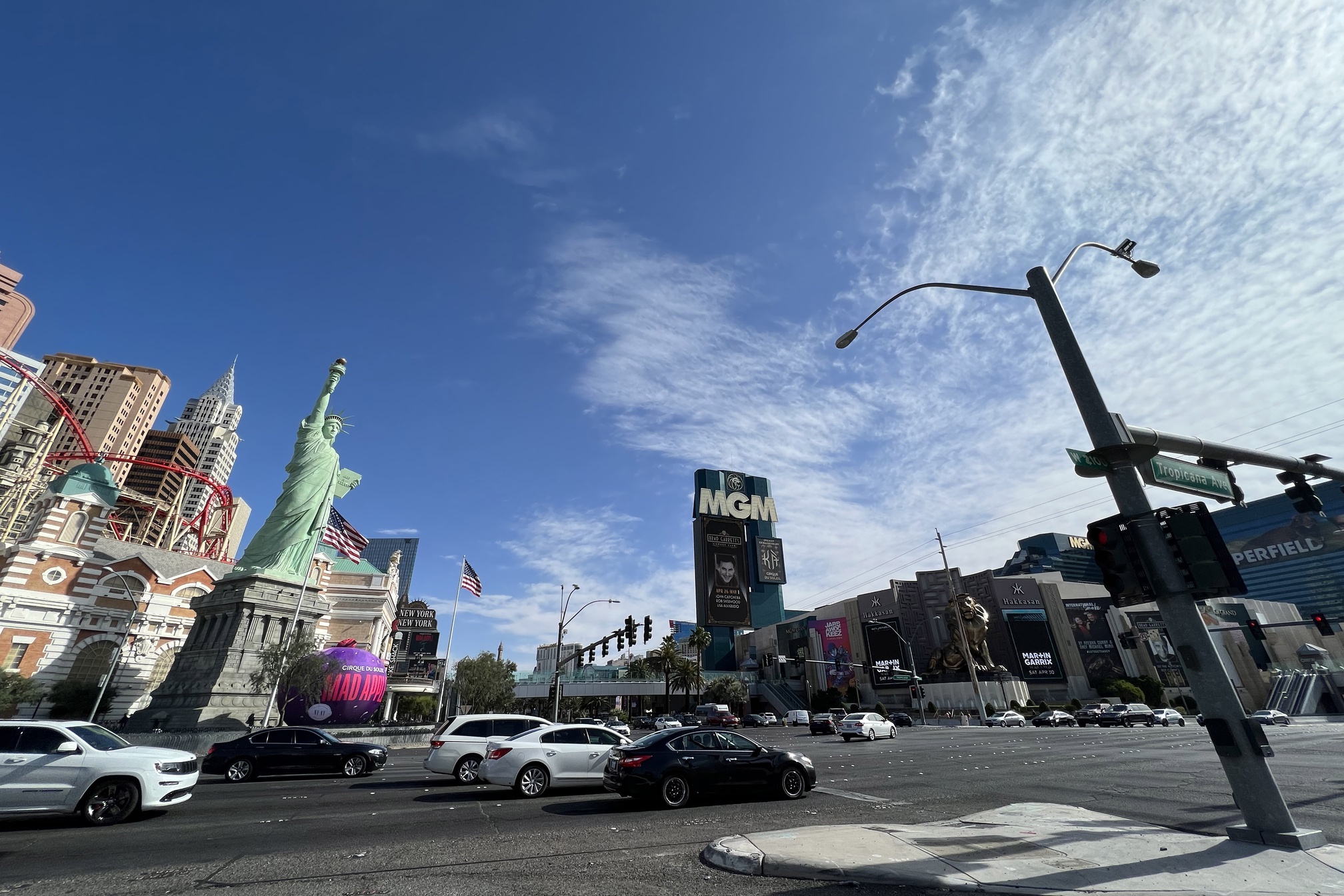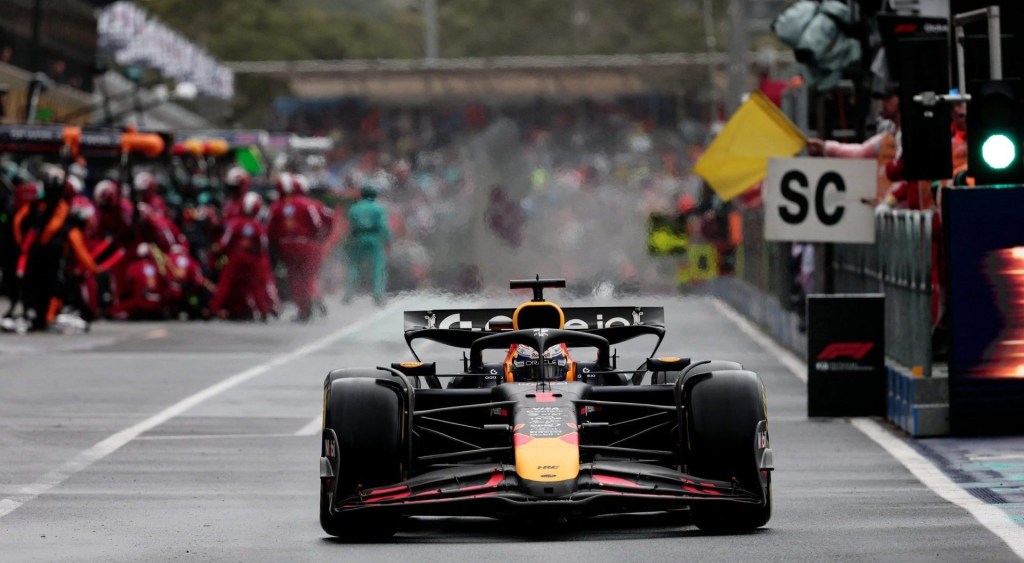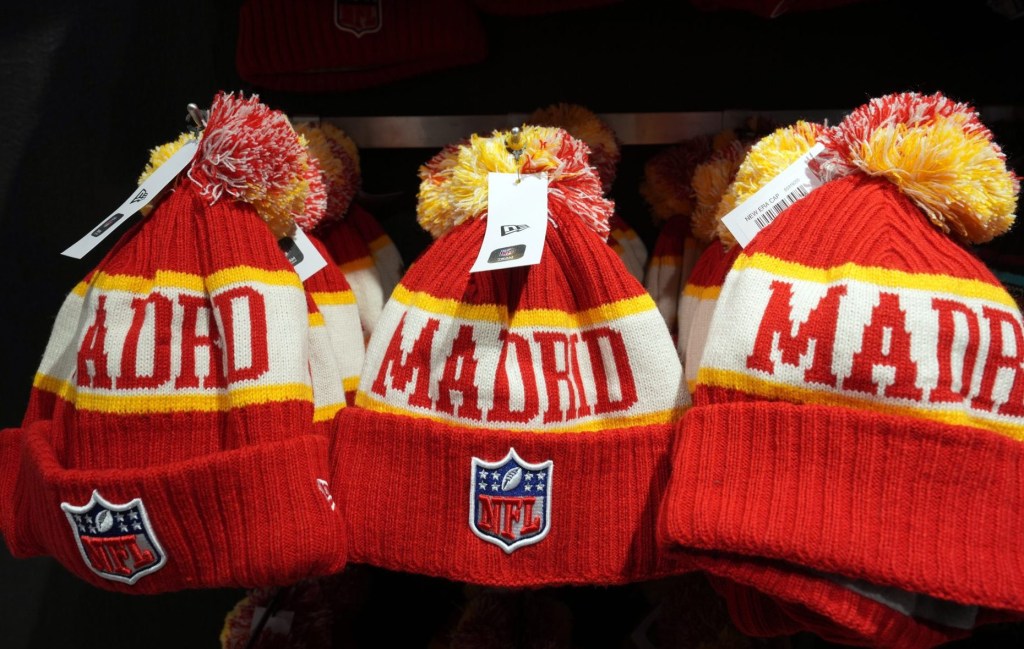The Las Vegas Strip is normally shut down only twice a year — for the Rock ‘n’ Roll Marathon and New Year’s Eve.
While April’s NFL Draft did shut down part of The Strip, it was a one-off event.
But the November 2023 return of Formula 1 will be what Steve Hill, CEO and president of the Las Vegas Convention and Visitors Authority, described as “the most difficult kind of event we could think about putting on.”
Hill recently talked with Front Office Sports at his office not far from where the circuit is already being prepped about the area’s pro sports surge that started with the Golden Knights and Las Vegas Aces and continued with the Raiders’ move to town and landing F1.
Hill also gives some insight into whether the MLB, NBA, and MLS could be on the horizon.
First, how excited are you to bring Formula 1 to town?
It’s great. I think it’s going to be fabulous for the city. There just aren’t many opportunities that are this big. I think it’s similar to having a Super Bowl in town every year.
It’s important that the timing of the race matches with when Las Vegas can handle it. Liberty Media and Formula 1 worked hard to make sure that the disruption on Las Vegas Boulevard was kept to a minimum, but the timing is going to be great. I think it’ll work well with Las Vegas’ schedule, and that’s important.
An event of this magnitude will cause much longer closures than those two annual events, the marathon and NYE. The logistics for such an event are complex, especially since when F1 was last here more than 30 years ago, the circuit consisted of just the parking lot at Caesars Palace. How much convincing did it take for casino executives and others in the community?
The southbound set of lanes [on Las Vegas Boulevard] will be used for the race. The northbound set of lanes will be inside the circuit. For hours at a time during the race intervals, the entire Strip will be closed. It will be eight-to-10 hours total. The Strip will actually be shut down.
There were legitimate concerns from the properties up and down the Resort Corridor, particularly around the logistics. You won’t want to lose weeks of Las Vegas [business due to the race] because at that point, no matter how great Formula 1 is, it is not going to make up for that.
This will clearly be the most difficult kind of event we could think about putting on because you’re going to have to close the main arterial [roadway], and the circuit is going to enclose a number of properties [within the racing circuit] for hours at a time. We’re going to build a couple of temporary vehicular bridges to allow people in and out of the interior and the circuit. That’s tough. I mean, it’s not easily done.
The list of requirements to make the streets of Las Vegas ready for F1 is lengthy. A lot of roads will need to be torn up and smoothed out before November 2023.
There is no place that would meet the specifications of FIA [Formula 1’s governing body] at this point, particularly on The Strip. It will just be done a lane or two at a time, a section at time. We’re constantly doing construction on Las Vegas Boulevard. I don’t think people will be able to tell the difference when it comes to construction work that’s going on for Formula 1 versus what it would have been without Formula 1.
The first talks with F1 occured when Chase Carey was still in charge, before Stefano Domenicali took over as CEO. How did talks that started roughly three years ago progress?
That was just a one-time conversation [in 2019] that Stefano picked back up in late spring of ‘21. They couldn’t travel here [due to COVID restrictions] to see if this was even possible. Flights started opening back up, and they visited for the first time in September. We met Stefano’s team, and he was joined by the Liberty Media folks.
Las Vegas has been a tourist destination for decades, but major pro sports have traditionally been harder to attract, outside of a bargaining chip to get a better stadium or arena deal. But with the Vegas Golden Knights, the 2018 Professional and Amateur Sports Protection Act (PASPA) that effectively legalized sports betting nationwide, and the Raiders’ relocation, it’s been a pretty quick turnaround.
If you could go back in time six or seven years and tell people all that we have now, people would’ve thought you hadn’t really had all the screws tightened down. Because of the gaming issue and the gambling issue, it seemed out of the question for a long time.
I was probably as surprised as anybody when [Knights owner] Bill Foley came along and said he was going to try and get that done with hockey. I thought, “Well, maybe hockey is more willing to do it.” Hockey didn’t seem at the time a logical sport to pair with Las Vegas. But they have done a textbook job of entering into the market. They embraced the city, and the city embraced them. Winning early mattered, and frankly, how they handled the October [2017] shooting was part of that bond.
The Raiders and the NFL were questioning whether Vegas was big enough. It’s not just about attending games. It’s about sponsors and suite purchases. There’s been a concern about the lack of corporate base here. But Vegas is a global city, and it brings people to this town who you don’t necessarily expect to show up who buy a suite or sponsor a team. That’s the power of the Vegas brand.
How is pro sports changing Las Vegas?
The meetings and convention industry is what allows Las Vegas to look like Las Vegas. It’s a foundational, critical piece of what we do. Sports is just what’s next here, and we’re right in the middle of that. We’re riding that wave, and it’s changing the business dynamic and the town.
It’s also changing the brand of Las Vegas. It has allowed us to even increase the excitement level of this town. It’s helped expand the customer base for the city. There are people who might not have thought about coming to Las Vegas before but now will because their teams play here. That just opens up a whole new spectrum of visitors, and that’s going to be really beneficial.
The Oakland A’s have been interested in Las Vegas for some time after multiple attempts to build a stadium in the East Bay have stalled. About $750 million in public financing was used to build the Raiders’ home, Allegiant Stadium. Will that greatly reduce any financial commitments from taxpayers to lure another pro sports team to town?
We don’t need to do that anymore. … We are on the cusp with Major League Soccer. I think they will all be here at some point — whether that happens now, I’m not sure. It has to be a combination of what makes sense for the team and what makes sense for this community. That’s gotta be worked out. Moving a team is a hard thing to do, as well. Things may work out for the A’s in Oakland, and they may stay.
Las Vegas will have a lot of opportunities. I think the leagues realize Las Vegas brings a lot to the table. Every one of those leagues, I have to think that they’d be better off if they had a franchise in Las Vegas. It’s pretty amazing it turned around within about five years.




![[Subscription Customers Only] Jun 15, 2025; Seattle, Washington, USA; Botafogo owner John Textor inside the stadium before the match during a group stage match of the 2025 FIFA Club World Cup at Lumen Field.](https://frontofficesports.com/wp-content/uploads/2026/02/USATSI_26465842_168416386_lowres-scaled.jpg?quality=100&w=1024)
![[Subscription Customers Only] Jul 13, 2025; East Rutherford, New Jersey, USA; Chelsea FC midfielder Cole Palmer (10) celebrates winning the final of the 2025 FIFA Club World Cup at MetLife Stadium](https://frontofficesports.com/wp-content/uploads/2026/02/USATSI_26636703-scaled-e1770932227605.jpg?quality=100&w=1024)







![[US, Mexico & Canada customers only] Feb 6, 2026; Riyadh, SAUDI ARABIA; Jon Rahm in action during the third round of play at LIV Golf Riyadh at the Riyadh Golf Club.](https://frontofficesports.com/wp-content/uploads/2026/03/USATSI_28173562_168416386_lowres-scaled.jpg?quality=100&w=1024)

![[US, Mexico & Canada customers only] Sep 28, 2025; Bethpage, New York, USA; Team USA's Bryson DeChambeau reacts after hitting his approach on the 15th hole during the singles on the final day of competition for the Ryder Cup at Bethpage Black.](https://frontofficesports.com/wp-content/uploads/2026/03/USATSI_27197957_168416386_lowres-scaled.jpg?quality=100&w=1024)

